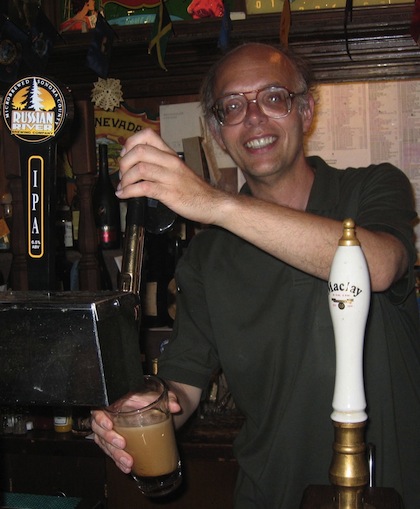Beer. America’s Beverage. A 20-foot-long scarlet banner, carried the slogan of the 11th annual wholesalers and brewers joint legislative conference, held April 1-4 in Washington, DC.
When someone lifts a cold one, he faces an unprecedented tax: 43 cents on the dollar.
To drive home the idea, the formal presentation began with a color guard marching Old Glory to the stage, followed by “The Star Spangled Banner” and the Pledge of Allegiance.

“When we stay focused and persistent, our destiny is in our hands,” insisted David Rehr, president of the National Beer Wholesalers Association (NBWA). One of the nation’s most effective lobbyists, Rehr leads the battle against over-taxation and over-regulation, the double-headed ogre that has menaced the beer industry since the early days of the Republic.
The lead issue this year is one that Joe Sixpack might not be familiar with—repeal of the inheritance tax (or, as Rehr called it, the “death tax”). Under the current law, when a family business changes hands after the death of the pater familias, the IRS can hit the new owners with a tax of up to 55 percent of the estate’s value. If the business is suffering from liquidity problems, the inheritors may be forced to sell. The NBWA supports eforts to phase out the tax.
A lot of craft brewers are still too young to worry about the inheritance tax, reflected Fred Bowman, vice president of Oregon’s Portland Brewing Co., but it may hit them down the road.
Portland Brewing was one of 56 small breweries represented at the conference. This marks a sharp increase from the 14 to 16 who participated last year, said Daniel Bradford, president of the Brewers Association of America (which looks out for the interests of those small brewers).
Trucking Issues
Another issue—one that may affect the freshness of your beer—is a nationwide shortage of beer truck drivers, some 285,000, by Rehr’s estimate. Currently, beer deliverymen are subject to the same federal testing and licensing requirements as the drivers of 18-wheel rigs who crisscross the country and sleep in their trucks. The NBWA maintains that the requirements are unwarranted, since beer truck drivers rarely venture more than 100 miles from their warehouses. The organization would like for states to have the option of setting less demanding requirements for short-range drivers.
A perennial goal of the beer industry is a rollback of the 1990 excise tax increase on beer. The government 11 years ago doubled the excise tax from $9 to $18 per barrel. Now that the government is running a surplus, the beer industry thinks it’s time to cut the tax to pre-1990 levels, especially since concurrent tax hikes on yachts, jewelry and private airplanes have all been repealed.
Rep. Phil English (R-PA) and Rep. Earl Pomeroy (D-ND) have sponsored such a bill, H.R. 1305. “When someone lifts a cold one, he faces an unprecedented tax: 43 cents on the dollar, cumulatively,” asserted English, one of several guest speakers to address the conference. “Nearly 65 percent of all beer is consumed in households earning less than $45,000 a year. This is certainly not a tax cut for the very rich.”
Of course, there’s no guarantee that retailers would pass on the savings to the consumer, admitted Jeff Becker, president of the Beer Institute (which represents the Bud-Miller-Coors contingent). And similar rollback attempts have died at the committee level in previous sessions of Congress.
Buckets of Beer
Attendees were also reminded of the beer industry’s efforts to fight alcohol abuse. “There are a lot of stories about college drinking,” bemoaned Becker. (Case in point: that morning’s Washington Post featured a front-page article about drunken frat boys torching furniture in the streets following the University of Maryland basketball team’s loss in the NCAAs.) “But nowadays college freshmen drink less than we did,” Becker maintained. He cited one statistic that the audience could be particularly proud of: drunk driving fatalities involving teenagers have decreased 64 percent between 1982 and 1999.
Buckets of “Beer. America’s Beverage” stickers were available for the taking, but Rehr cautioned attendees not to give them out to minors. “If you’re in doubt, ask for an I.D.,” he advised.
One matter that didn’t make the agenda was blood alcohol limits. Last year, Congress passed the FY 2001 transportation appropriations bill, which threatens to withhold millions of dollars in federal highway funds from states that don’t adopt a .08 BAC standard for DWI violations. “We’re looking for an opportunity to strike or change that,” said Rehr, “but the probability of doing that is not high.”
As loudspeakers piped in a John Philip Sousa march, Rehr dispatched the troops, color-coded position papers in hand, to get the message to their congressmen. “Don’t be intimidated!” Rehr urged. “These people work for you!” With a record turnout of 1,050 at the conference, he hoped to hit every office on Capitol Hill.
Lobbying involves a lot of legwork. “The first day is the killer,” one wholesaler was overheard telling another. “Five hours of sleep just doesn’t do it.”









